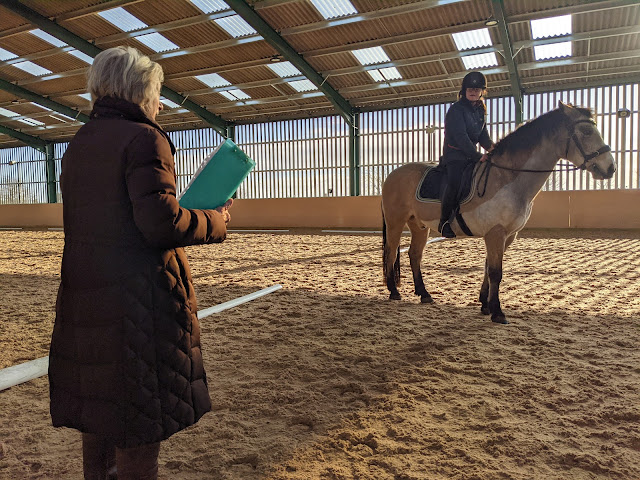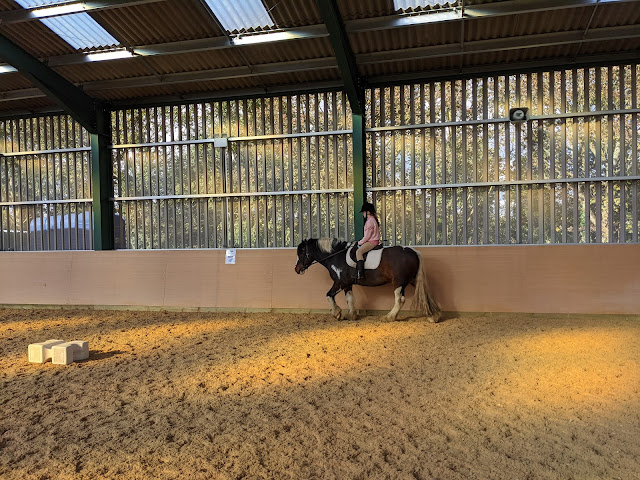Eight ways to build confident RDA coaches
 |
| Waveney Luke coaching Mia, a rider and volunteer from my group, riding dun Connemara, Ernie |
I don’t think you need to be a naturally confident person to be a good RDA coach, but we do all need to be happy with the idea that coaching is a leadership role, and that it might take the time to develop certain forms of confidence to do that role well. I think one of RDA’s great strengths is helping people to find confidence they never would have otherwise discovered, and RDA coaching is no exception. I’ve put together some ideas for how we can develop as confident coaches, including some which have helped me, for this week’s post.
Have you tried any of these ideas yourself, or do you think they might help you in the future?
1. Goldilocks planning
Planning your coaching sessions seems like an obvious strategy for making you feel more self-assured in your role, but there isn’t a straightforward positive correlation between doing more planning and feeling more confident – or indeed, making your session run more smoothly. Some things do well with, or even depend on, minutely detailed, firmly fixed plans: RDA is not one of these things. There are way too many variables, particularly parties with minds of their own which have no reason to be tuned into your agenda if they don’t wish it. (I mean horses, but this could be about people too!)
We’ve all fallen foul of a micromanaged to-the-minute session plan which sounded like a dream and a breeze when we wrote it down, but just made us feel even less sure of ourselves when it really didn’t work out like that in real life. I’ve come to the conclusion that we should plan our sessions like Goldilocks: not too little, not too much, but just the right amount. Is there anything you need to set out in advance? What’s your overarching aim or focus? How flexible can you be with timings? (Probably more flexible than you might think!) Most importantly, what are your riders going to gain from the session, and what will they enjoy? You can feel in control of all this stuff without it being over planned, and everyone is likely to enjoy themselves more.
2. Alphabet planning
The only thing I do think is worth thinking about as much as humanly possible in RDA coaching is contingency planning. I know a lot of my own confidence comes from feeling in control of what I’m doing. If I’m doing something like coaching where there are lots of things which could threaten that sense of control (horses are like that…) then I regain that feeling by considering very carefully what I would do in X, Y, or Z situation. It’s the kind of thinking that comes hand in hand with risk assessments, although it’s slightly more reactive than proactive. What would you do if this horse came in lame and you needed to use a different one? What would you do if the volunteer who regularly works with a particular rider was unwell one week? Do you need a contingency for bad weather? Do you need to wait and see how a new horse and rider combination work together? You can do at least some of this contingency planning ahead of time, in whatever format helps it settle in your mind. You don’t have to be born ready like Lucy (scroll to the bottom of this post), but you can feel confident in the knowledge that you have thought out plans B through to M as well as making a plan A.
3. Specialist subjects
Confident chefs know their ingredients. How well do you know the constituent parts of your RDA sessions? There are three which are the most important: horses, participants, and volunteers (please do not cook or eat any of them). You don’t have to know everything about all three to feel confident in a coaching role, but working to build up your knowledge and understanding as far as possible can really help you feel suitably armed to take on anything. If you have a knowledge gap in one area – a new horse, helper, or rider – then being more of an expert on the other two will help with your planning and make you feel more in control of the situation. I also very strongly believe that knowing a person (or horse) well makes it easier for you to project confidence onto them: this in turn means they are more inclined to build up trust in you, which means everyone feels more confident. The best thing about this advice is that I think almost all RDA coaches are genuinely interested in both people and ponies: gaining expert status in the characters of the ones which surround us is an enjoyable task.
4. Find your tribe
If you’re not feeling especially self-assured in your coaching, you’re probably going to have better luck seeking reassurance from people who aren’t you to build up your own confidence. In an ideal world this would be a person or people at your own group, whether a formal or informal mentor, but there’s no reason why it should be limited to this, especially in such a digitally connected world. Every coach – in every sport or activity – deserves a support network which is as genuine as it is helpful and knowledgeable. Even if you aren’t a particularly nervous or un-confident coach, you never know when that network might come in handy: I am pretty objective about the goods, bads, ups and downs of my coaching, but have found in the past that emotional changes and challenges outside of RDA have given me cause to question myself and need a bit of external reassurance. Many friendships have grown out of RDA coaches supporting each other, often between people who would never have otherwise been in the same space. There will be somebody out there who clicks with you.
 |
| Natalie riding Jimbob. Being this far away from her while coaching was something I really had to work up to! |
I’ve met RDA coaches who are definitely worriers. (When my group started back after lockdown, I was definitely one of them.) You might have something very specific which sets off your worries, or it might just be an overall sense of being overwhelmed. Have you ever stopped to think about why these things worry you? For me, there was a very clear fear of the unknown, of transmitting Covid to someone at the stables and harming them, and of doing the wrong thing when the world was yet to develop a clear understanding of what that was. After establishing this, I was able to work out that what I needed was practice: I needed to get into our new post-Covid routine and feel how things were working, then build on that. Being objective and honest about what’s bothering you and why might not make the worries go straight away, but it gives you a much better chance of tackling them.
6. Cheer yourself on
It’s great to be a reflective coach: that’s going to build skill, and strategy, and insight. If you know you’re struggling a bit with confidence, it’s going to be much more constructive to lead any sort of reflection or record keeping with some positives: about you, not just how well your riders rode! Did you have a good rapport with the participants? Did you feel in control? Were you happy with the corrections you were able to give? Did you really like how your new game went? Start with this stuff before moving onto anything more critical. You’re not going to feel confident about your own coaching if you start off by tearing strips off yourself. Get in to the habit of cheering yourself on.
7. Don’t apologise
I once went to a public speaking seminar at a conference and was told “too many people apologise for things that they might or might not get slightly wrong. Save apologies for when you’ve actually done something bad.” Actually, that idea of not apologising for commanding the space (master coaches I’ve watched like Clive Milkins never do when they’re in the area) and not anticipating slipping up is so relevant to being a coach. If you’re a volunteer, like so many RDA coaches are, you also have a bit of a psychological boost from how you have actively chosen to show up and make a difference to people. Why be timid about that? If you’re the sort of person who gets flustered under pressure it can feel too easy to apologise for everything: taking longer than planned on part of the session; not knowing the answers to things (even questions about stuff outside of your remit); not being as forthright or confident as other coaches. Does it really need a “sorry”? You’re doing something meaningful that not everyone can or wants to do. No apologies needed here.
8. Never say never
It’s fine to draw lines when it comes to voluntary commitments and say “no” from time to time – sometimes it’s absolutely necessary for your own well-being (although that’s not a carte blanche to get out of mucking in with the mucking out!). One word I’d advise against, though, is “never”. Even if you’re feeling a bit unsure of yourself now, whether you’re a brand new coach finding your feet, or a more experienced coach finding your way or experiencing a confidence dip, you are still more than capable of growing and developing and achieving new things – it just might be something for the future, rather than right now. I know there are techniques and skills I’m not 100% on right now which I’m chasing for the future. You’ll have to come back and read about them when I eventually get there. I'd love to hear about your achievements too.
 |
| Two young riders riding a chestnut and a piebald pony (Jasper and Elbow) in our original indoor arena |



You wrote this post very carefully.Confidence Coach and Confidence Coaching London The amount of information is stunning and also a gainful article for us. Keep sharing this kind of articles, Thank you.
ReplyDelete